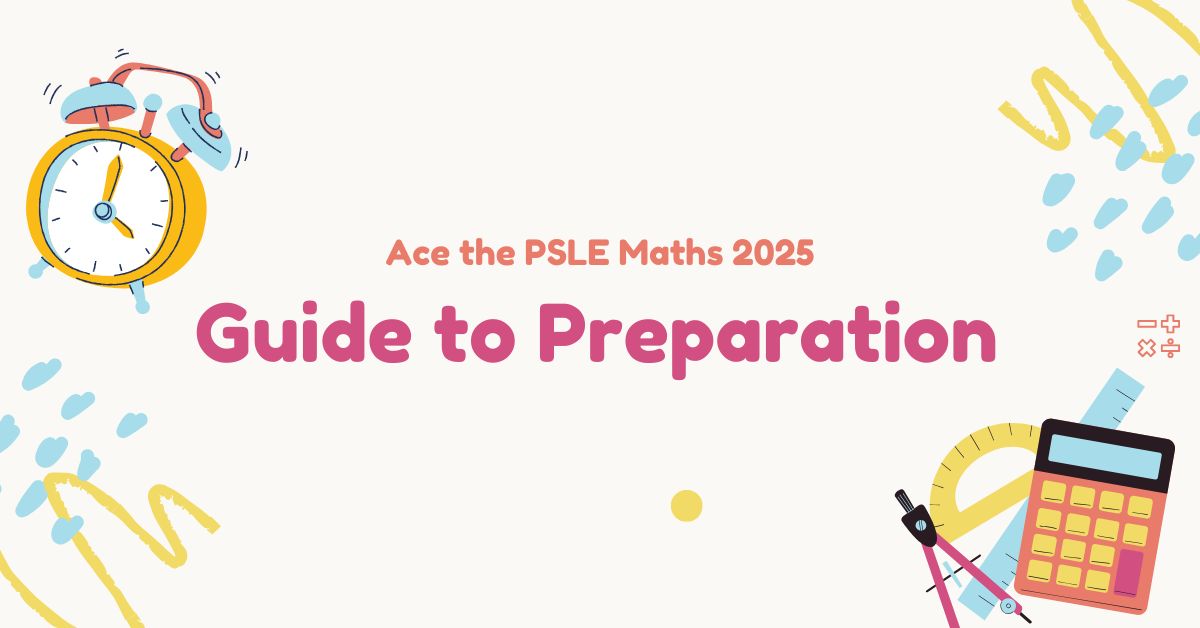The Primary School Leaving Examination (PSLE) is a significant milestone for students in Singapore, and Mathematics is often a source of both excitement and anxiety. Preparing effectively for the PSLE Maths 2025 requires a structured approach, focusing on conceptual understanding, consistent practice, and strategic test-taking skills. This guide provides a roadmap to help students navigate their preparation effectively and confidently.
Know the PSLE Maths Syllabus
Before diving into preparation, it’s crucial to understand the PSLE Maths syllabus. Familiarize yourself with the topics covered, the weighting of each topic, and the types of questions typically asked. The syllabus outlines key concepts in areas such as:
Number and Algebra: This section covers whole numbers, fractions, decimals, percentages, ratios, rates, and speed, along with algebraic expressions and equations.
Measurement: This involves understanding units of measurement, calculating areas and volumes, and solving problems related to time, mass, and length.
Geometry: This section covers shapes, angles, lines, and their properties, as well as the application of geometrical concepts to problem-solving.
Data Analysis: Students need to understand how to interpret and analyze data presented in various forms, including bar graphs, pie charts, and line graphs.
Phase 1: Building a Strong Foundation (P3 & P4)
Success in PSLE Maths isn’t built overnight. A solid foundation is crucial, beginning from Primary 3 and Primary 4. This phase focuses on mastering fundamental concepts:
Conceptual Understanding: Avoid rote learning. Focus on understanding why formulas and methods work, not just memorizing them. Use visual aids, real-world examples, and interactive learning to grasp concepts deeply.
Regular Practice: Consistent, daily practice is key. Solve a variety of problems, ranging from simple to complex, to build confidence and fluency.
Identify Weak Areas: Regularly assess your child’s understanding. Identify weak areas early and address them promptly through targeted practice and additional support.
Teacher Collaboration: Maintain open communication with your child’s teacher. Seek guidance on areas requiring improvement and discuss appropriate learning strategies.
Phase 2: Mastering Problem-Solving Skills (P5 & P6)
Primary 5 and Primary 6 mark the transition to more challenging problem-solving questions. This phase emphasizes developing crucial skills:
Heuristic Strategies: Teach your child various problem-solving strategies, such as drawing diagrams, working backwards, making tables, and looking for patterns. These strategies are essential for tackling complex word problems.
Model Drawing: This visual technique is particularly helpful for solving word problems, especially those involving fractions, ratios, and percentages. Mastering model drawing significantly improves problem-solving abilities.
Practice Past Papers: Regularly work through past PSLE Maths papers to familiarize yourself with the question format, difficulty level, and time constraints. Analyze mistakes to understand common errors and refine problem-solving skills.
Time Management: Practice solving questions within a specific time limit to improve speed and efficiency. This is crucial for managing time effectively during the actual examination.
Phase 3: Refining Techniques and Strategies (P6)
This final phase focuses on polishing skills and building exam readiness:
In-depth Review: Thoroughly review all topics, focusing on areas where your child still faces challenges. Target specific weak points for improvement.
Mock Exams: Simulate exam conditions by taking full-length mock exams under timed conditions. This helps reduce exam anxiety and builds confidence.
Exam Technique: Teach your child effective PSLE exam techniques, such as reading questions carefully, identifying keywords, and checking answers thoroughly. Prioritizing questions based on difficulty and marks allocated is crucial.
Mental Maths: Practice mental calculation to improve speed and efficiency. This frees up time for more complex problems.
Seek External Support: If needed, consider seeking support from tuition centers or private tutors specializing in PSLE Maths preparation. Choose tutors who emphasize conceptual understanding and effective problem-solving strategies.
Beyond the Textbook: Engaging Resources
Beyond textbooks and workbooks, various resources can enhance learning and engagement:
Online Learning Platforms: Many online learning platforms offer interactive lessons, practice exercises, and personalized learning experiences.
Maths Games and Puzzles: Make learning fun with engaging maths games and puzzles that reinforce concepts and develop problem-solving skills.
Real-world Applications: Relate math concepts to real-life situations. This helps students appreciate the practical relevance of the subject.
Addressing Exam Anxiety
Exam anxiety is common. Help your child manage stress by:
Positive Reinforcement: Focus on effort and progress, not just results. Celebrate achievements and provide encouragement.
Adequate Sleep and Rest: Ensure your child gets enough sleep and rest in the lead-up to the exam.
Healthy Diet and Exercise: Maintain a healthy diet and encourage regular physical activity to reduce stress and improve focus.
Relaxation Techniques: Teach your child relaxation techniques, such as deep breathing or meditation, to help manage anxiety.
Final Words
Preparing for the PSLE Maths 2025 requires a strategic and consistent approach. By focusing on building a strong foundation, mastering problem-solving skills, refining techniques, and managing exam anxiety, students can approach the exam with confidence and achieve their best results. Remember, it’s a marathon, not a sprint. Consistent effort and a positive attitude are key ingredients for success.


